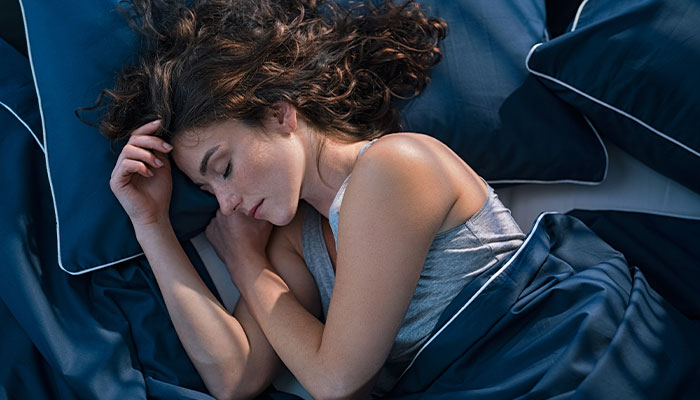Many people have noticed their alcohol consumption creeping up during the pandemic, due to factors including the stress and anxiety of lockdown, uncertain employment, the ever-present threat of serious illness, and the pressures of home schooling.
Every year, FebFast encourages Australians to give up alcohol (or another bad habit) for a month to raise money for young people affected by alcohol or drug misuse.
The long-term benefits of giving up alcohol are well known, like reducing the risk of certain types of cancer, heart disease, liver disease and dementia, and improving mental health. But could you begin to notice any benefits after just 28 days?
Better sleep
Drinking alcohol results in worse quality sleep. If you have a fitness tracker or smart watch, just compare your sleep results for the days when you’ve had a few drinks to those on your alcohol-free days.
While you might find you fall asleep more easily, the overall quality of your rest is poorer, and the more you drink, the worse you’ll sleep.

Sleep easy: Not drinking alcohol can improve the quality of your sleep, with more than two drinks tending to delay our REM sleep.
More than two drinks at a time tends to delay our REM (rapid eye movement) sleep, which is vital if we are to learn and retain new information and regulate our moods.
Concentration and memory are also linked to how well we sleep. Better sleep is the quickest win from giving up alcohol, as you’ll start to notice improvements from the very first night. And because you’ve slept better, you’ll also notice a boost in your energy levels.
Weight loss
Alcohol is extremely energy dense and nutrient poor, making it a bad choice if you’re trying to lose weight. A pint of full-strength beer contains nearly 900kj – more than a glazed donut – but other alcoholic beverages pack a punch of their own. A standard glass of white wine contains about 500kj and a glass of red has 540kj, which is more than a chocolate biscuit.
Mixed drinks add extra calories thanks to the sugary soft drinks and juices used as mixers: a gin and tonic or a bourbon and cola each have about 800kj. And the news just gets worse with cocktails: some of the creamy ones can have as many kilojoules as a well-known fast-food burger – 2350kj. After two pina coladas, a woman has blown most of her recommended intake for an entire day.

Weight right there: Just like fast food, alcohol is packed with nutrient-poor kilojoules, and to make matters worse, drinking also leads to bad food choices.
If you cut out those two glasses of wine with dinner every night, you’ll save 1000kj, which for women represents roughly a sixth of the average recommended daily intake. Over four weeks, that adds up to 28,000 kilojoules, or seven burgers with large fries.
And while we’re talking about burgers and fries, alcohol is notorious for leading to poor impulse control, meaning we don’t make great decisions when drinking – including decisions about what to eat.
Within a week or two of quitting alcohol, even a moderate drinker could notice a more settled stomach.
We crave things that are high in fat and salt, then the next morning, a greasy breakfast seems like a great idea to aid the recovery.
If you had ‘lose weight’ at the top of your list of New Year’s resolutions but haven’t had much success yet, a month of no alcohol could be just the kickstarter you need.
A healthier liver
People who drink heavily (four or more drinks a day) or who binge drink (six or more drinks at a time) may be suffering from alcoholic fatty liver disease without even knowing it. Left untreated, this can result in jaundice, confusion, and extreme tiredness, and it is a major cause of chronic liver disease in Western countries.
This isn’t a benefit you’ll notice immediately as fatty liver in its early stages has no symptoms. At this early point, though, it is reversible, and a month without alcohol could make a huge difference.
A happier stomach
Our digestive systems rely on good bacteria to keep working properly, but alcohol can disrupt this, leading to an increase in bad bacteria that can result in bloating and discomfort. It can also damage the mucous membranes in the stomach and inhibit acid production.
And we hate to have to point it out, but some alcoholic beverages, like beer, can cause flatulence. Within a week or two of quitting alcohol, even a moderate drinker could notice a more settled stomach. Your partner and friends may very well thank you too.
Being properly hydrated
Anyone who has woken up with a hangover recognises the signs of dehydration: a throbbing headache, a dry mouth and nausea. Alcohol acts as a diuretic, stripping water from our bodies, and it’s not helped by the fact that when people are drinking alcohol, they don’t think to drink water as well. (And no, the soda water in that vodka, lime and soda doesn’t count.)
In Australia, we need to drink about 1.5 to 2 litres of water a day, and this increases with warm weather and physical activity. Proper hydration brings a number of benefits, including better skin with less acne, and improved energy levels.
Improved sports performance
Want to perform better in your chosen sport, or even just on your morning jog or cycle? Reducing your alcohol consumption is just the ticket.
If you aren’t properly rested because the previous night’s beverages have disrupted your sleep, you’re increasing your risk of being injured because your motor skills are impaired, so your hand/eye coordination and your reaction time are both going to be down. Being properly hydrated is also vital for peak performance.
Valentina Duong is an Accredited Practising Dietician at MQ Health’s Healthy Weight Clinic








